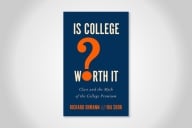You have /5 articles left.
Sign up for a free account or log in.
By many measures, this fall's freshman class at the University of Kentucky is just what the university was looking for. For the second year in a row, the number of applications topped 10,000 (for a class of just over 3,800), and university officials could boast about increasing numbers of applicants with high ACT scores or high school grades.
But there was a glaring exception to all the good news: The numbers of black students admitted and enrolling were way down. Of the 757 black applicants for admission this fall (roughly the same as last year's total), 360 were admitted (down from 481) and 151 enrolled (down from 256). In explaining the 40 percent drop in black freshmen, Kentucky officials cited the higher ACT scores, on average, of white students. Those comments infuriated black legislators and other leaders, who said that the university was implying that black students could not succeed at Kentucky.
Last week, the university moved to repair those relations -- and to attract more black students -- by announcing a major change in admissions policy. For the first time, the university will be adding essays to applications and those essays will emphasize diversity issues. The university also announced a "holistic" approach to admissions in which those essays and other factors will receive in-depth attention. Previously, test scores and grades in high school were the basis of admissions decisions.
Other public institutions -- such as the University of California and the University of Michigan -- have made similar shifts to a holistic approach. But they acted following a referendum and a Supreme Court ruling, respectively. Those institutions are also -- by the standards of public institutions -- wealthy. Reading essays for every student and refusing to rule anyone out because of a test score -- as Kentucky is now pledging to do -- requires a larger admissions staff of the sort that is common at private institutions but difficult to support at many large publics. Lee Todd, the president of Kentucky, announced that three additional admissions readers would be hired immediately (on top of six already employed) and five additional positions would be created to recruit students.
"We want to look beyond test scores, at all of the things that make up a person," said Don Witt, assistant provost for enrollment management and director of undergraduate admissions at Kentucky. Witt said that the drop on black enrollments was a "hard blow" but that he hoped it had led to a "healthy" change in university policies.
The university has seen ever increasing test scores, making Kentucky more competitive, Witt said. "But at what cost?" he asked. "We need to remember that many students come to the university with low test scores and succeed."
To identify such students, Kentucky will now ask much more detailed questions about non-academic experiences, and will also ask all applicants three open-ended essay questions:
- How do you stand out from other candidates?
- How can you contribute to diversity?
- What obstacles or challenges have you faced in your life?
In the past, Witt said, applications were "reviewed," not "read," because they primarily contained just data and relatively little information that would help the university admit a more diverse class. "Now we will be reading every single freshman application submitted to UK -- no matter what the students' scores, no matter the background," he said.
"We think students will feel much more fairly treated," he said.
Witt said that there was no specific decision on how to weigh the various additional factors in admissions or a specific goal for enrollment levels, although he said there was a wide sense on the campus that the black enrollment figure should rise. He noted that the university is a flagship and needs to play a role in helping all of the state's citizens.
The black legislators who were angered by the enrollment drop and the university's explanation for it have generally praised the admissions changes, while saying that they want to see the results.
Other legislators have been pushing the university to show increases in ACT averages as a measure of the institution's success in becoming a top public university -- a goal set by lawmakers. Witt said, however, that he would be very pleased if the new system attracts more black students -- even if the ACT average falls.
"I would much rather have a student involved in a community and in the classroom in different ways, even with a lower score," he said. "Everybody gets caught up in this race of scores, and it will be nice to get away from that."








